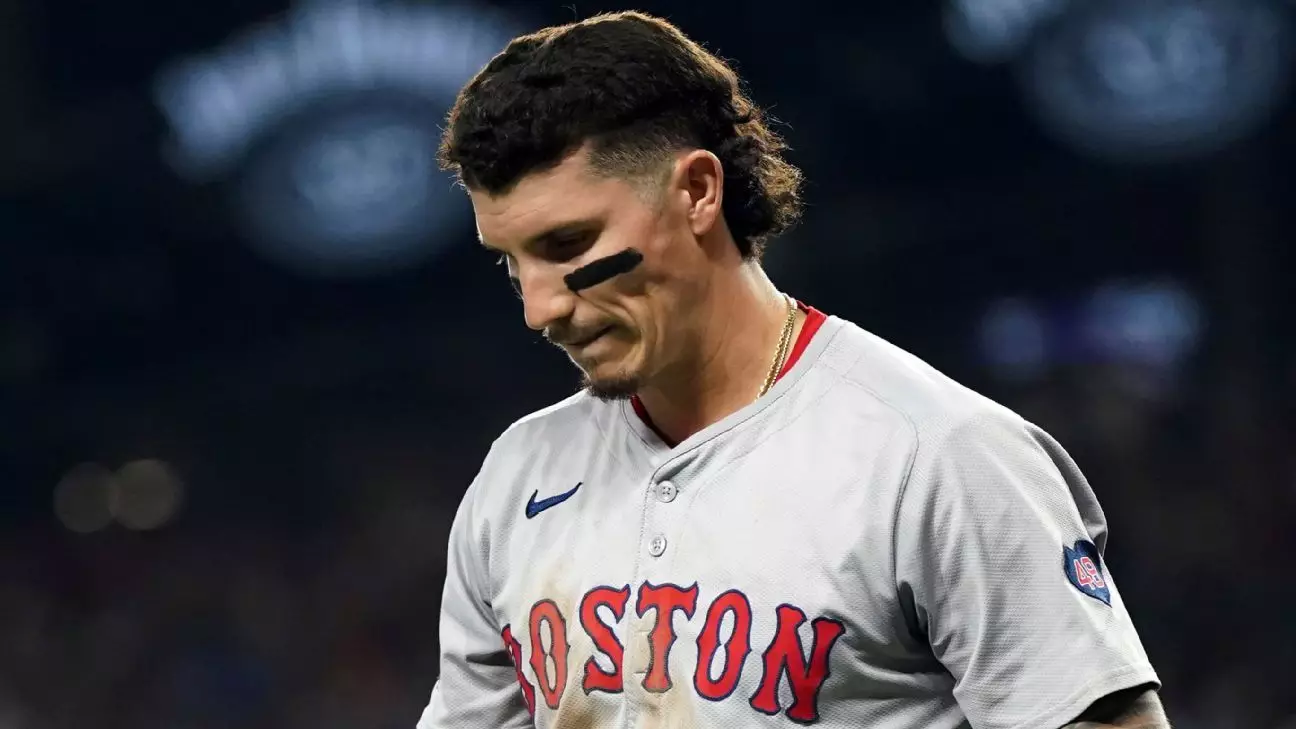In a world where mental health often resides in the shadows, Jarren Duran’s courageous admission surrounding his 2022 suicide attempt shines a much-needed spotlight on a topic many are hesitant to discuss. In the recent Netflix docuseries “The Clubhouse: A Year With the Red Sox,” Duran took the brave step of sharing his deeply personal journey with mental health struggles, candidly revealing that he found himself in a dark place early in his baseball career. With vulnerability as his guiding force, he articulated a message of hope, aimed at those who feel isolated in their fights against depression.
Duran’s openness is refreshing amidst a culture that frequently stigmatizes such discussions. His declaration—”If my story can help even one person, then it was worth telling”—encompasses the essence of his intent. It’s not merely a personal narrative; it’s a lifeline for others who may feel ensnared by similar darkness. When a public figure like Duran discloses his mental health issues, it provokes a powerful dialogue that can resonate far beyond the confines of baseball.
The Weight of Expectations
Navigating the major leagues is no small feat, and for Duran, the pressure led to heightened self-criticism and mental anguish. He metaphorically depicted players as “zoo animals,” underscoring the intrusive nature of public scrutiny that comes with being a professional athlete. The expectations of performance can appear insurmountable, especially for individuals trying to establish their foothold in a sport revered for its competitiveness.
In recounting his struggles, Duran touched on a crucial reality: the internal dialogue we construct can often be more damaging than external judgments. “I couldn’t deal with telling myself how much I sucked every day,” he lamented. This poignant acknowledgment reveals how athletes can become their own harshest critics, compounding feelings of inadequacy with relentless self-beratement. It’s a stark reminder that while fans may jeer from the stands, the most detrimental words often come from within.
Managerial Support and the Power of Community
Duran’s courageous revelation did not go unnoticed by his team and organization. Red Sox Manager Alex Cora noted that such openness could very well save lives, emphasizing the importance of dialogue around mental health in sports—a realm notoriously reluctant to embrace vulnerability. Team President Sam Kennedy echoed this sentiment, calling Duran’s act not just an endeavor for personal healing, but a significant gesture of solidarity for countless others battling similar demons.
This communal backbone is indispensable as it fosters an environment where athletes can shed the rigid facade of invulnerability. Duran’s story has ignited discussions around mental health within Major League Baseball, demonstrating the potential impact of peer support and organizational understanding. When communities rally around individuals facing such trials, it can create a culture where vulnerability is normalized, and asking for help is seen as a sign of strength rather than weakness.
Parental Perspectives
Duran’s parents, Octavio and Dena, expressed their dismay upon learning the depth of their son’s struggles. They articulated a heartfelt gratitude for his ability to articulate his experiences, which reinforces yet another layer of support for those grappling with mental health issues. Familial connections play a crucial role in recovery, and Duran’s experience underlines the importance of open communication between parents and their children about emotional well-being.
Their appreciation for Duran’s resilience is palpable, echoing a sentiment that resonates with many parents: the wish to protect their children from pain while simultaneously empowering them to confront their realities. This instance exemplifies how open discussions can bridge generational gaps in understanding and compassion, thus facilitating healthier conversations around mental health within families.
A Renewed Focus on the Future
Now, as he attempts to redirect his focus back to baseball, Duran demonstrates a commendable commitment to his personal and professional growth. With recent on-field success—recording six hits in four games—he seems eager to channel his energy toward his career aspirations. “We have a postseason to chase,” he stated emphatically, underscoring the importance of both mental and physical fortitude in sports.
This pivot reinforces the notion that overcoming personal struggles doesn’t mean sidelining one’s ambitions. Instead, it serves as a motivating force, potentially enhancing performance and encouraging others in similar situations to pursue their passions, even amidst hardship. Moreover, Duran’s message of support—encouraging those who struggle to seek help—resounds as a beacon of hope for many, whether in sports or daily life.
Jarren Duran’s decision to share his story stands as a formidable reminder of the fragility of mental health, but equally reveals the potential for recovery and the impact of community. His transparency invites not just a conversation, but a narrative of resilience that could inspire countless individuals to seek help and acknowledge their struggles in a supportive environment.


Leave a Reply